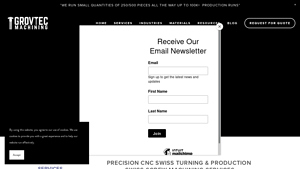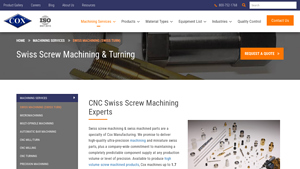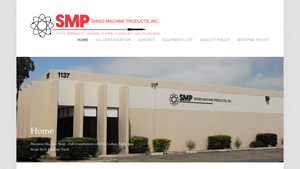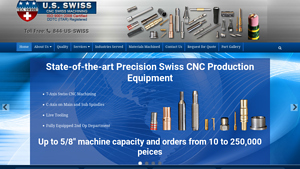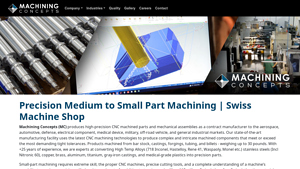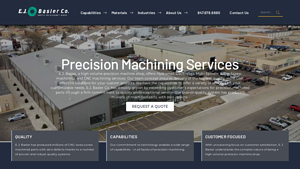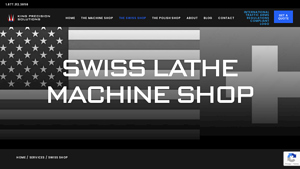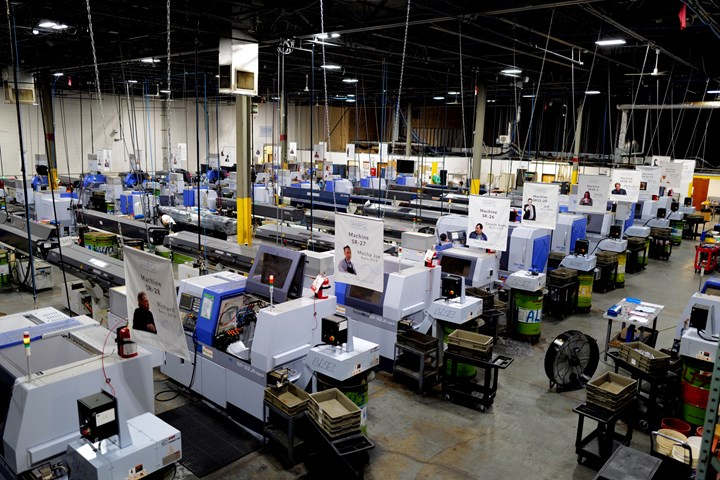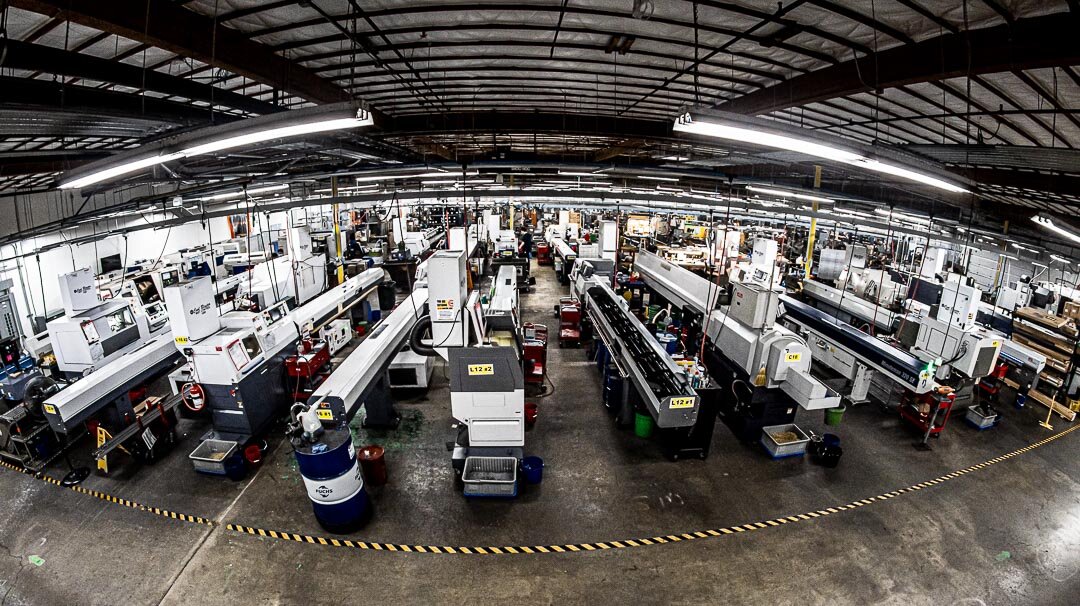Top 8 Swiss Machine Shop Manufacturers & Suppliers List
1. GrovTec Machining – Precision Swiss Machining Services
Domain: grovtecmachining.com
Registered: 2014 (11 years)
Introduction: GrovTec Machining offers precision Swiss machining services, including Swiss CNC machining, micro machining, multi spindle screw machining, single spindle screw machining, Hydromat machining, CNC milling, design & prototyping, and mechanical assembly. They specialize in high mix low volume and high volume production runs, with no minimum order quantities. Their capabilities include producing parts…
2. Cox Manufacturing – Swiss Screw Machining
Domain: coxmanufacturing.com
Registered: 2003 (22 years)
Introduction: Cox Manufacturing specializes in Swiss screw machining and turning, offering high-quality ultra-precision machining for miniature parts. They produce up to 1.7 million precision components weekly, utilizing a range of Swiss equipment including CNC Swiss Turn machines from Tsugami and Tornos. Their capabilities include micromachining, multi-spindle machining, and high volume screw machining. They w…
3. Swiss Machine Products – Precision CNC Manufacturing
Domain: swissmachine.com
Registered: 2000 (25 years)
Introduction: Swiss Machine Products offers high precision manufacturing services utilizing a full complement of CNC lathes, mills, and Swiss style machine tools. The company specializes in high tolerance, mid-sized production runs for aerospace, medical, automotive, and commercial applications. They are ISO 13485 certified and have been in operation since 1959. The company focuses on smart manufacturing practi…
4. Swiss Machining – Precision CNC Parts
Domain: swissmachining.com
Registered: 2018 (7 years)
Introduction: Precision Swiss CNC Machining, Custom CNC Parts, 7-Axis Swiss CNC Machining, C-Axis on Main and Sub Spindles, Live Tooling, Fully Equipped 2nd Op Department, Up to 5/8″ machine capacity, Orders from 10 to 250,000 pieces, Medical and Dental Components, Aerospace and Military Products, ISO 9001:2008 Certified, ITAR registered, Micromachining, CNC Swiss turning/milling, Custom machining, Secondary op…
5. Machining Concepts – Precision CNC Machined Parts
Domain: machiningconcepts.com
Registered: 1998 (27 years)
Introduction: Machining Concepts produces high-precision CNC machined parts and mechanical assemblies for various industries including aerospace, automotive, defense, electrical component, medical device, military, off-road vehicle, and general industrial markets. They specialize in medium to small part machining using state-of-the-art CNC technologies. Products are machined from bar stock, castings, forgings, …
6. E.J. Basler Co. – Precision CNC Swiss Screw Machining
Domain: ejbasler.com
Registered: 1996 (29 years)
Introduction: E.J. Basler Co. is a high volume precision machine shop specializing in CNC Swiss screw machined parts. Key capabilities include Swiss Screw Machining, Precision Metal Brazing, Manufacturing Assemblies, Multi-Spindle Machining, Hydromat Machining, Davenport Machining, and CNC Machining. The company works with a wide range of materials including various grades of Carbon Steel, Brass, Lead-free Bras…
7. Swiss Lathe – Cost Analysis
Domain: reddit.com
Registered: 2005 (20 years)
Introduction: The discussion revolves around estimating the costs of running a Swiss lathe for in-sourcing manufacturing. Key points include: 1. Current expenditure of $15-20k per month at a Swiss lathe shop for small parts. 2. Estimated cost of a new Swiss machine is around $400k, with financing leading to monthly payments of approximately $8500. 3. Additional costs to consider include utilities, cutting/cooli…
8. King Precision Solutions – Swiss Lathe Machining Services
Domain: kingprecisionsolutions.com
Registered: 2010 (15 years)
Introduction: King Precision Solutions offers Swiss lathe machining services utilizing advanced Swiss CNC machines, specifically the Tornos GT-26 and GT-32. The facility is located in Erie, PA, and is ITAR certified and ISO 9001-compliant. The Swiss lathe machining services can achieve tolerances as tight as ± 0.0002″ and are capable of machining medium to large runs of exotic materials including stainless stee…
Introduction: Navigating the Global Market for swiss machine shop
In today’s competitive landscape, sourcing precision components from a Swiss machine shop can be a daunting task for international B2B buyers. The challenge lies not only in finding suppliers that meet stringent quality standards but also in understanding the complexities of different machining processes and their applications. This guide aims to demystify the world of Swiss machining, offering a comprehensive overview that covers various types of Swiss machine shops, the applications of their services, and essential tips for vetting suppliers effectively.
As we delve into the intricacies of Swiss machining, you will discover the benefits of this advanced manufacturing technique, including its ability to produce intricate parts with tight tolerances and minimal secondary operations. We will also explore cost considerations, ensuring you can make informed purchasing decisions that align with your budget and operational needs.
This guide is specifically tailored for international buyers from regions such as Africa, South America, the Middle East, and Europe, including countries like Nigeria and Vietnam. By equipping you with the necessary knowledge and insights, we empower you to confidently navigate the global market for Swiss machine shops, ensuring that your sourcing decisions are both strategic and beneficial for your business. Whether you are looking for high-volume production or specialized components, this guide serves as your essential resource for successful procurement in the world of precision machining.
Understanding swiss machine shop Types and Variations
| Type Name | Key Distinguishing Features | Primary B2B Applications | Brief Pros & Cons for Buyers |
|---|---|---|---|
| CNC Swiss Machining | Utilizes CNC technology for precision and automation | Aerospace, Medical Devices, Electronics | Pros: High precision, reduced lead times; Cons: Higher initial setup costs. |
| Swiss Screw Machining | Features sliding headstock and guide bushing for stability | Automotive, Fluid Control, Fasteners | Pros: Tight tolerances, efficient for small parts; Cons: Limited to smaller components. |
| Multi-Axis Swiss Turning | Offers multiple axes for complex geometries | Robotics, Telecommunications, Defense | Pros: Capable of intricate designs; Cons: Complexity may lead to longer programming times. |
| High Mix Low Volume | Supports diverse production runs without minimum order limits | Prototyping, Custom Components | Pros: Flexible for varying demands; Cons: May have higher per-unit costs. |
| High Volume Production | Focuses on large-scale manufacturing with automated processes | Mass Production, Consumer Goods | Pros: Cost-effective for large quantities; Cons: Less adaptable to design changes. |
What Are the Characteristics of CNC Swiss Machining?
CNC Swiss machining is characterized by its use of computer numerical control (CNC) technology, which enhances precision and efficiency. This type of machining is ideal for producing intricate components with tight tolerances, making it suitable for industries such as aerospace and medical devices. B2B buyers should consider the initial setup costs against the long-term benefits of reduced lead times and higher accuracy, which can justify the investment for high-volume projects.
How Does Swiss Screw Machining Differ from Other Types?
Swiss screw machining is specifically designed with a sliding headstock and guide bushing, allowing it to maintain stability during the machining of smaller parts. This method is particularly advantageous for producing high-precision components used in automotive and fluid control applications. Buyers should evaluate the need for tight tolerances and the size of parts required, as this method excels in producing smaller, complex geometries but is less suited for larger components.
What Advantages Does Multi-Axis Swiss Turning Offer?
Multi-axis Swiss turning machines provide enhanced capabilities for creating complex geometries through their ability to operate on multiple axes simultaneously. This makes them suitable for industries like robotics and telecommunications, where intricate designs are often required. However, the complexity of programming these machines can lead to longer setup times, making it essential for buyers to assess their production timelines and design requirements carefully.
Why Choose High Mix Low Volume Swiss Machining?
High mix low volume Swiss machining allows manufacturers to cater to diverse production needs without imposing minimum order quantities. This flexibility is particularly beneficial for prototyping and custom component manufacturing. While the per-unit costs may be higher compared to large-scale production, the ability to adapt quickly to changing demands can provide significant value for buyers looking to innovate or test new designs.
What Is the Focus of High Volume Production Swiss Shops?
High volume production Swiss machine shops specialize in mass manufacturing, leveraging automated processes to produce large quantities of parts efficiently. This approach is ideal for industries such as consumer goods, where cost-effectiveness is crucial. Buyers should consider the trade-off between cost savings and the potential limitations in adaptability for design changes, as these shops may not accommodate small batch requests as readily.
Key Industrial Applications of swiss machine shop
| Industry/Sector | Specific Application of Swiss Machine Shop | Value/Benefit for the Business | Key Sourcing Considerations for this Application |
|---|---|---|---|
| Medical Devices | Production of precision components for surgical instruments | Ensures high accuracy and reliability in critical applications | Certifications (ISO, FDA), material traceability |
| Aerospace | Manufacturing of intricate parts for aircraft systems | Reduces weight while enhancing performance and safety | Compliance with aerospace standards, lead times |
| Automotive | Creation of complex components for engines and transmissions | Improves efficiency and performance in vehicle systems | Scalability for high-volume production, cost-effectiveness |
| Electronics | Fabrication of small, precise parts for electronic devices | Supports miniaturization and high performance in devices | Precision requirements, quick turnaround times |
| Oil & Gas | Machining components for valves and pumps | Enhances durability and reliability in harsh environments | Material specifications, custom designs, delivery timelines |
How is Swiss Machining Used in Medical Devices?
Swiss machine shops play a critical role in the medical device industry by producing precision components for surgical instruments and implants. These parts must meet stringent quality standards and tolerances, as even minor discrepancies can lead to severe consequences in patient safety. Buyers in this sector should prioritize suppliers with relevant certifications, such as ISO and FDA approvals, and ensure that they can provide material traceability to comply with regulatory requirements.
What Applications Exist for Swiss Machining in Aerospace?
In the aerospace sector, Swiss machining is utilized to manufacture intricate components for aircraft systems, including brackets, housings, and fasteners. The lightweight and high-strength properties of these parts are essential for optimizing aircraft performance and safety. International buyers must consider suppliers’ compliance with aerospace standards, such as AS9100, and assess their capabilities for rapid production to meet tight deadlines in this highly competitive industry.
How Does Swiss Machining Benefit the Automotive Industry?
The automotive industry leverages Swiss machine shops to create complex components used in engines, transmissions, and other critical systems. This method enables manufacturers to produce parts with high precision, contributing to the overall efficiency and performance of vehicles. Buyers should focus on suppliers that can handle scalability for high-volume production while maintaining cost-effectiveness, as this is vital for meeting consumer demand and staying competitive.
What Role Does Swiss Machining Play in Electronics?
In the electronics sector, Swiss machining is essential for fabricating small, precise parts that fit into increasingly compact devices. This process supports the trend towards miniaturization, allowing for high performance in electronic products. B2B buyers should emphasize precision requirements and quick turnaround times when sourcing from Swiss machine shops, as these factors directly impact the development cycles of electronic devices.
How is Swiss Machining Applied in the Oil & Gas Sector?
Swiss machine shops are integral to the oil and gas industry, manufacturing components such as valves and pumps that must withstand harsh environmental conditions. The durability and reliability of these parts are crucial for maintaining operational efficiency. Buyers should specify material requirements and seek custom designs to ensure that the components meet the unique challenges of their specific applications, along with considering delivery timelines to avoid project delays.
3 Common User Pain Points for ‘swiss machine shop’ & Their Solutions
Scenario 1: Navigating High Setup Costs for Low Volume Production
The Problem: Many B2B buyers, particularly those in emerging markets, face the challenge of high setup costs associated with low volume production runs in Swiss machine shops. They often require precision parts but may not meet the minimum order quantities that some shops impose. This situation can lead to frustration, as buyers are left with the dilemma of either overpaying for parts or compromising on quality by seeking out less capable manufacturers.
The Solution: To effectively address this issue, buyers should prioritize Swiss machine shops that offer flexibility in order quantities without compromising on quality. When sourcing, look for shops that explicitly state their support for high mix low volume production runs. Engaging in a dialogue with potential partners about their capabilities can yield insights into how they handle setup costs. Additionally, consider negotiating blanket orders or long-term contracts that allow for smaller, staggered deliveries. This can help amortize setup costs over a longer period while ensuring you maintain access to high-quality parts.
Scenario 2: Ensuring Precision in Complex Parts Manufacturing
The Problem: Precision is critical for industries such as aerospace and medical devices, where even the slightest deviation can lead to significant failures. B2B buyers often find themselves concerned about the ability of Swiss machine shops to meet tight tolerances and complex geometries, especially when dealing with intricate designs. This uncertainty can delay projects and increase costs if parts need to be reworked or replaced.
The Solution: Buyers should prioritize partnerships with Swiss machine shops that specialize in advanced CNC technologies and have a proven track record in precision machining. Request detailed information about their capabilities, such as the types of machinery they use, their quality assurance processes, and examples of past projects that required similar specifications. It’s beneficial to ask for samples or prototypes to evaluate their precision before committing to larger orders. Furthermore, utilizing CAD/CAM software can facilitate clearer communication of design specifications, ensuring that both parties are aligned on expectations from the outset.
Scenario 3: Dealing with Long Lead Times and Uncertainty
The Problem: In the fast-paced world of manufacturing, long lead times can severely impact production schedules, especially for companies needing quick turnaround for urgent projects. B2B buyers often experience anxiety over the uncertainty of lead times when placing orders with Swiss machine shops, which can lead to production delays and potential financial losses.
The Solution: To mitigate lead time issues, buyers should conduct thorough research on potential Swiss machine shops’ operational efficiencies. Look for shops that utilize automated systems, such as bar feeders and lights-out machining, which can significantly reduce cycle times and increase production capacity. Inquire about their typical lead times and any guarantees they may offer for repeat orders. Establishing a strong relationship with your chosen machine shop can also lead to improved responsiveness and prioritization of your orders. Consider implementing a vendor-managed inventory (VMI) system to maintain a buffer stock, which can help alleviate the pressures of lead time uncertainties while ensuring continuous production flow.
Strategic Material Selection Guide for swiss machine shop
What Are the Key Properties of Common Materials Used in Swiss Machine Shops?
When selecting materials for Swiss machining, it is essential to consider their properties in relation to the intended application. Here are some common materials used in Swiss machine shops, along with their key properties, advantages, disadvantages, and considerations for international B2B buyers.
1. Stainless Steel
Key Properties: Stainless steel is known for its excellent corrosion resistance, high strength, and ability to withstand high temperatures. It typically has a temperature rating of up to 870°C and can handle pressures in various applications.
Pros & Cons: The durability of stainless steel makes it suitable for a wide range of applications, including medical devices and automotive parts. However, it can be more expensive than other materials and may require more complex machining processes due to its hardness.
Impact on Application: Stainless steel is compatible with various media, including corrosive fluids, making it ideal for industries like oil and gas, medical, and food processing.
Considerations for International Buyers: Compliance with international standards such as ASTM or DIN is crucial. Buyers from regions like Africa and South America should ensure that suppliers can provide certifications for the specific grades of stainless steel they require.
2. Aluminum
Key Properties: Aluminum is lightweight, has good corrosion resistance, and excellent thermal conductivity. It typically operates effectively at temperatures up to 150°C.
Pros & Cons: The primary advantage of aluminum is its low weight, making it ideal for applications where reducing weight is critical. However, it is less durable than stainless steel and may not perform well under high-stress conditions.
Impact on Application: Aluminum is often used in aerospace, automotive, and consumer electronics due to its favorable weight-to-strength ratio. It is also compatible with various media, including water and some chemicals.
Considerations for International Buyers: When sourcing aluminum components, buyers should verify the alloy specifications and ensure compliance with local standards. This is particularly important for industries that require specific grades for safety and performance.
3. Brass
Key Properties: Brass offers excellent machinability, corrosion resistance, and good electrical conductivity. It operates effectively in temperatures up to 200°C.
Pros & Cons: The ease of machining brass makes it a popular choice for precision parts, such as fittings and connectors. However, it can be more expensive than aluminum and may not be suitable for high-stress applications.
Impact on Application: Brass is commonly used in plumbing, electrical applications, and decorative items due to its aesthetic appeal and conductivity.
Considerations for International Buyers: Buyers should be aware of the environmental regulations regarding lead content in brass, especially in regions with strict compliance requirements, such as Europe.
4. PEEK (Polyether Ether Ketone)
Key Properties: PEEK is a high-performance thermoplastic known for its excellent chemical resistance, high-temperature stability (up to 260°C), and mechanical strength.
Pros & Cons: PEEK’s ability to withstand harsh environments makes it suitable for aerospace, automotive, and medical applications. However, it is considerably more expensive than metals and may require specialized machining techniques.
Impact on Application: PEEK is compatible with a wide range of chemicals and can operate in extreme conditions, making it ideal for applications in the oil and gas industry and high-performance medical devices.
Considerations for International Buyers: Buyers should ensure that their suppliers can meet the stringent quality and performance standards required for PEEK applications, particularly in regulated industries.
Summary Table of Material Selection for Swiss Machine Shops
| Material | Typical Use Case for Swiss Machine Shop | Key Advantage | Key Disadvantage/Limitation | Relative Cost (Low/Med/High) |
|---|---|---|---|---|
| Stainless Steel | Medical devices, automotive parts | Excellent corrosion resistance | Higher cost and machining complexity | High |
| Aluminum | Aerospace, automotive, consumer electronics | Lightweight and good conductivity | Less durable under high stress | Medium |
| Brass | Plumbing fittings, electrical components | Excellent machinability and conductivity | Higher cost, not for high-stress applications | Medium |
| PEEK | Aerospace, medical devices | High-temperature stability | Very high cost and specialized machining | High |
This strategic material selection guide provides essential insights for international B2B buyers, helping them make informed decisions when sourcing precision components from Swiss machine shops.
In-depth Look: Manufacturing Processes and Quality Assurance for swiss machine shop
What Are the Main Stages of Manufacturing in a Swiss Machine Shop?
The manufacturing processes in a Swiss machine shop are designed for precision and efficiency, particularly suited for high-quality, tight-tolerance parts. Here are the main stages involved:
Material Preparation: How Is Raw Material Selected and Processed?
The first step in the manufacturing process involves selecting the appropriate raw materials based on the specifications of the project. Common materials used include aluminum, stainless steel, brass, and various alloys. Once selected, these materials are prepared, which may involve cutting them into appropriate lengths for the CNC Swiss machines. This preparation is critical to ensure that the material is free from defects and suitable for machining.
How Is Material Formed Using Swiss Turning Techniques?
Swiss turning is characterized by its unique operational setup. The machines employ a sliding headstock and guide bushing system that allows for precise control over the material being machined. The bar stock is secured in the headstock, which rotates it while the cutting tools move in and out to create the desired shapes. This setup enables the production of intricate parts with high precision, often holding tolerances of ±0.0001 inches. The efficiency of Swiss machining allows for the completion of complex parts in a single setup, minimizing handling time and reducing the risk of errors.
What Role Does Assembly Play in Swiss Machining?
For many projects, the assembly stage may not be applicable if the parts produced are standalone components. However, for more complex assemblies, Swiss machine shops may integrate additional operations to join multiple components. This could involve automated processes or manual assembly, depending on the complexity and precision required. Ensuring that each part fits perfectly is essential for the overall quality of the final product.
What Finishing Techniques Are Common in Swiss Machine Shops?
Finishing processes in Swiss machining can include deburring, polishing, and surface treatment to enhance the part’s appearance and functionality. These techniques are vital for meeting specific industry standards and customer requirements. For instance, parts used in the medical or aerospace industries may require stricter finishing processes to ensure reliability and safety.
How Is Quality Assurance Implemented in Swiss Machine Shops?
Quality assurance (QA) is a critical component of the manufacturing process in Swiss machine shops, ensuring that parts meet international standards and customer specifications.
What International Standards Govern Swiss Machine Shop Quality Control?
Swiss machine shops often adhere to international quality standards such as ISO 9001, which provides a framework for quality management systems. Compliance with these standards ensures that the shop maintains consistent quality in its processes and outputs. Additionally, industry-specific certifications such as CE for European markets and API for the oil and gas sector may also be relevant, depending on the nature of the parts being manufactured.
What Are the Key QC Checkpoints During Manufacturing?
Quality control checkpoints are integrated throughout the manufacturing process to catch defects early and ensure adherence to specifications. These include:
- Incoming Quality Control (IQC): Materials are inspected upon arrival to verify they meet required specifications.
- In-Process Quality Control (IPQC): Ongoing checks during machining operations monitor dimensions and tolerances to ensure compliance.
- Final Quality Control (FQC): Completed parts undergo thorough inspection and testing before shipment to confirm that they meet customer and regulatory standards.
Which Testing Methods Are Commonly Used in Swiss Machine Shops?
Various testing methods are employed to validate the quality of the manufactured parts. Common methods include:
- Dimensional Inspection: Utilizing tools such as calipers and micrometers to measure critical dimensions.
- Functional Testing: Ensuring that the parts perform as expected in their intended applications.
- Material Testing: Assessing properties like hardness, tensile strength, and corrosion resistance.
How Can B2B Buyers Verify Supplier Quality Control?
When sourcing from a Swiss machine shop, B2B buyers must ensure the supplier’s quality assurance processes are robust and transparent. Here are several strategies to verify QC:
What Steps Can Buyers Take to Conduct Supplier Audits?
Performing supplier audits is one of the most effective ways to assess a machine shop’s quality control measures. Buyers can request to visit the facility to observe processes, inspect equipment, and review documentation related to quality management systems. A checklist for audits may include verifying certifications, reviewing quality control records, and discussing testing methods with the management team.
How Can Buyers Request and Review Quality Reports?
B2B buyers should request quality reports that detail inspection results, including any non-conformance issues and corrective actions taken. These reports provide insight into the supplier’s commitment to quality and their ability to resolve issues effectively.
What Role Do Third-Party Inspections Play in Quality Assurance?
Engaging third-party inspection services can offer an unbiased assessment of the supplier’s quality control processes. These inspectors can verify compliance with international standards and provide certification that can be valuable for buyers needing to meet regulatory requirements in their own markets.
What Are the Quality Control Nuances for International Buyers?
For international B2B buyers, particularly those from Africa, South America, the Middle East, and Europe, understanding the nuances of quality control is essential. This includes:
- Regulatory Compliance: Different regions may have varying requirements for product certification. Familiarizing oneself with these regulations can prevent costly compliance issues.
- Cultural Considerations: Communication styles and business practices can differ widely, impacting negotiations and quality expectations. Building strong relationships with suppliers can facilitate better understanding and collaboration on quality standards.
- Logistics and Supply Chain Management: Understanding the logistics involved in international shipping can help mitigate risks related to delays or damage, which can ultimately affect quality.
In conclusion, a thorough understanding of the manufacturing processes and quality assurance practices within Swiss machine shops empowers B2B buyers to make informed decisions. By prioritizing quality and ensuring effective communication with suppliers, buyers can secure high-quality components that meet their specific needs.
Practical Sourcing Guide: A Step-by-Step Checklist for ‘swiss machine shop’
In today’s competitive landscape, sourcing the right Swiss machine shop is critical for businesses seeking precision manufacturing solutions. This guide offers a comprehensive checklist to help international B2B buyers navigate the procurement process effectively.
Step 1: Define Your Technical Specifications
Before reaching out to potential suppliers, clearly outline your technical requirements. Consider factors such as the dimensions, tolerances, materials, and production volumes needed. This clarity will not only streamline your discussions with suppliers but also help them provide accurate quotes and timelines.
- Material Requirements: Identify specific materials required for your parts (e.g., aluminum, stainless steel).
- Tolerances: Define the precision levels necessary for your components.
Step 2: Research Potential Suppliers
Begin by compiling a list of Swiss machine shops that align with your specifications. Utilize online resources, industry directories, and trade shows to identify reputable suppliers. Pay attention to their experience, machinery capabilities, and customer reviews.
- Industry Experience: Look for shops that have a proven track record in your specific industry.
- Technology Investment: Check if they use modern CNC Swiss machines for optimal efficiency and precision.
Step 3: Evaluate Supplier Certifications
It is essential to verify that your potential suppliers hold relevant certifications, such as ISO 9001 or industry-specific standards. These certifications demonstrate their commitment to quality management and adherence to industry best practices.
- Quality Assurance: Certifications ensure that the supplier meets stringent quality control processes.
- Regulatory Compliance: Confirm that they comply with local and international manufacturing regulations.
Step 4: Request Quotes and Compare Pricing
Once you have narrowed down your list, send out requests for quotes (RFQs). Provide detailed specifications to ensure that the quotes are comparable. Take note of not only the prices but also lead times and payment terms.
- Volume Discounts: Inquire about pricing structures for bulk orders or long-term contracts.
- Transparency in Costs: Ensure there are no hidden fees in the quotes provided.
Step 5: Assess Lead Times and Production Capacity
Understanding a supplier’s lead times is crucial for planning your production schedule. Discuss their capacity to handle your order volume and their flexibility for future adjustments.
- Production Efficiency: Check their ability to deliver within your required timeframe, especially for repeat orders.
- Scalability: Assess if they can accommodate fluctuations in demand.
Step 6: Check References and Past Work
Before finalizing your choice, ask for references and examples of past work. This step allows you to gauge the supplier’s reliability and the quality of their output.
- Client Feedback: Reach out to previous clients to understand their experiences regarding quality, service, and communication.
- Portfolio Review: Examine case studies or samples that demonstrate their expertise and capabilities.
Step 7: Finalize Contract Terms
Once you have selected a supplier, ensure that all terms are clearly outlined in a formal contract. This should cover pricing, delivery schedules, payment terms, and quality expectations.
- Legal Protections: Ensure that the contract includes clauses for quality assurance and remedies in case of discrepancies.
- Communication Channels: Establish clear lines of communication for ongoing support and updates.
By following this checklist, B2B buyers can make informed decisions when sourcing from Swiss machine shops, ensuring quality and efficiency in their manufacturing processes.
Comprehensive Cost and Pricing Analysis for swiss machine shop Sourcing
What Are the Key Cost Components in Swiss Machine Shop Sourcing?
When sourcing from a Swiss machine shop, understanding the cost structure is crucial for effective budgeting and decision-making. The primary cost components include:
-
Materials: The choice of raw materials significantly impacts pricing. Common materials like aluminum, stainless steel, and brass can vary widely in cost based on market demand and availability. More specialized materials, such as PEEK or ULTEM, may incur higher costs due to their properties and processing requirements.
-
Labor: Skilled labor is essential in Swiss machining due to the precision required in the manufacturing process. Labor costs can vary by region, with labor rates generally being higher in developed markets compared to emerging economies. Additionally, the complexity of the parts being produced will affect labor time and, consequently, the cost.
-
Manufacturing Overhead: This includes the operational costs of running the machine shop, such as utilities, maintenance, and equipment depreciation. Efficient operations can help keep these costs down, but buyers should inquire about the shop’s operational efficiencies.
-
Tooling: Swiss machining often requires specialized tooling, which can be a significant upfront investment. The costs of tooling will depend on the complexity and volume of the parts being produced. Custom tooling can lead to higher initial costs, but may provide cost savings in the long run for high-volume runs.
-
Quality Control (QC): Ensuring the precision and quality of parts is non-negotiable in Swiss machining. The costs associated with QC processes, including inspections and certifications, should be factored into the overall pricing. Certifications such as ISO can add to the credibility but may also influence costs.
-
Logistics: Shipping and handling costs can vary based on the destination, weight, and dimensions of the parts. For international buyers, understanding shipping options and associated costs is vital for accurate budgeting.
-
Margin: Finally, the profit margin that the supplier adds to cover their expenses and ensure profitability can vary. This often depends on the shop’s reputation, capabilities, and the complexity of the parts being produced.
What Influences Pricing in Swiss Machine Shops?
Several factors can influence the pricing structure in Swiss machine shops:
-
Volume/MOQ (Minimum Order Quantity): Generally, higher volumes will reduce the per-unit cost due to economies of scale. Many machine shops are willing to work with low-volume orders, but understanding the MOQ can help in negotiating better pricing.
-
Specifications and Customization: Custom parts that require intricate designs or specific tolerances may incur additional costs. The more detailed the specifications, the more resources and time will be needed to fulfill the order.
-
Materials: As previously mentioned, the choice of materials can drastically affect pricing. Buyers should consider both the material costs and the implications of using more expensive materials on the overall budget.
-
Quality and Certifications: Certifications can enhance the credibility of the machining process but may also increase costs. Buyers should weigh the importance of certifications against their budget and project needs.
-
Supplier Factors: The supplier’s experience, technology, and reputation can impact pricing. Established suppliers with advanced machinery may charge a premium but can offer superior quality and faster turnaround times.
-
Incoterms: Understanding international shipping terms can help buyers manage logistics costs effectively. Incoterms define the responsibilities of buyers and sellers in shipping, which can influence overall pricing.
How Can Buyers Optimize Costs When Sourcing from Swiss Machine Shops?
For international B2B buyers, particularly from regions like Africa, South America, the Middle East, and Europe, optimizing costs involves strategic negotiation and understanding the nuances of pricing:
-
Negotiate Terms: Always engage in discussions regarding pricing, MOQs, and payment terms. Establishing a good rapport with suppliers can lead to better deals.
-
Consider Total Cost of Ownership (TCO): Look beyond initial pricing. Consider long-term costs associated with maintenance, logistics, and potential rework. A slightly higher upfront cost may yield savings if the quality reduces the need for reorders.
-
Stay Informed on Pricing Trends: Market fluctuations can impact material costs and, consequently, the overall pricing. Staying informed can help in making timely purchasing decisions.
-
Utilize Local Resources: Engaging local representatives or sourcing agents can help navigate language barriers and cultural differences, leading to more effective negotiations.
Disclaimer on Indicative Prices
While this analysis provides insights into the cost structure and pricing influences of Swiss machine shops, it is essential to recognize that actual prices may vary based on specific project requirements, supplier capabilities, and market conditions. Always request detailed quotes to ensure accurate budgeting for your machining needs.
Alternatives Analysis: Comparing swiss machine shop With Other Solutions
Introduction: Exploring Alternatives to Swiss Machine Shops
In the realm of precision manufacturing, Swiss machine shops are renowned for their ability to produce high-quality, complex components with tight tolerances. However, buyers may find themselves evaluating other machining methods and solutions that can meet their specific requirements. This analysis compares Swiss machine shops with alternative machining solutions, providing insights into performance, cost, implementation, maintenance, and best use cases to aid international B2B buyers in making informed decisions.
Comparison Table
| Comparison Aspect | Swiss Machine Shop | CNC Lathe Machining | Traditional Manual Machining |
|---|---|---|---|
| Performance | High precision, tight tolerances | Good precision, limited by operator skill | Variable precision, dependent on operator skill |
| Cost | Higher due to specialized equipment | Moderate, lower setup costs | Generally low, but labor-intensive |
| Ease of Implementation | Requires skilled operators, setup can be complex | Easier to set up, familiar to many machinists | Simple setup, but skill-dependent |
| Maintenance | High maintenance needs for complex machinery | Moderate maintenance required | Low maintenance, but more frequent adjustments needed |
| Best Use Case | High-volume, intricate parts | Medium-volume, standard parts | Low-volume, custom or prototype parts |
Detailed Breakdown of Alternatives
CNC Lathe Machining
CNC lathe machining is a widely adopted method that uses computerized controls to execute precise cuts and shapes. The performance of CNC lathes is generally good, but it may not achieve the same level of precision as Swiss machining for smaller parts. The cost of CNC lathe machining is moderate and often more accessible due to lower setup requirements. For B2B buyers needing medium-volume production with less intricate designs, CNC lathes present a viable alternative, especially for components that do not require extreme tolerances.
Traditional Manual Machining
Traditional manual machining involves using hand-operated tools and machines, relying heavily on the skills of the machinist. While this method can be cost-effective, especially for low-volume runs, it suffers from variability in precision due to the operator’s skill level. Maintenance requirements are low compared to CNC and Swiss machining, but manual setups can be time-consuming. This method is best suited for custom or prototype parts where flexibility and low initial investment are priorities, making it appealing for startups or smaller businesses.
Conclusion: Choosing the Right Machining Solution for Your Needs
Selecting the appropriate machining solution depends on various factors including the desired precision, volume of production, and budget constraints. For international B2B buyers, Swiss machine shops are optimal for high-volume production of intricate parts requiring tight tolerances. However, CNC lathe machining may be suitable for medium-volume runs with less complexity, while traditional manual machining can fulfill custom, low-volume needs effectively. By assessing specific project requirements and operational capabilities, buyers can make informed decisions that align with their production goals and resource availability.
Essential Technical Properties and Trade Terminology for swiss machine shop
What Are the Key Technical Properties in Swiss Machine Shops?
Understanding the technical properties associated with Swiss machining is crucial for B2B buyers to ensure they choose the right manufacturing partner. Here are some critical specifications that influence the quality and feasibility of production:
-
Material Grade
The choice of material grade is foundational in Swiss machining. Common materials include stainless steel, aluminum, brass, and various plastics like PEEK and ULTEM. Each material has unique properties, such as corrosion resistance or strength, that affect the performance of the final product. Buyers must specify the appropriate material grade to meet their application requirements, ensuring durability and functionality. -
Tolerance
Tolerance refers to the permissible limit of variation in a physical dimension of a part. In Swiss machining, tolerances can be extremely tight, often as precise as +/- 0.0001 inches. This level of precision is essential for industries such as medical devices and aerospace, where even minor deviations can result in product failure. Understanding tolerance specifications helps buyers evaluate a machine shop’s capability to meet their exacting standards. -
Production Volume
Production volume impacts pricing and lead times. Swiss machine shops often cater to both low-volume and high-volume runs. High-volume production can reduce per-unit costs due to amortized setup expenses, while low-volume runs are beneficial for prototyping or specialized parts. Buyers should communicate their anticipated production volume to ensure the shop can meet their needs effectively. -
Cycle Time
Cycle time is the total time taken from the start of a machining operation to the completion of a part. Swiss machining typically offers shorter cycle times than traditional CNC machining due to its automated processes and efficient design. For B2B buyers, understanding cycle times can help in planning inventory and managing supply chain expectations. -
Complexity of Features
The ability to produce complex features with multi-axis machining is a hallmark of Swiss turning. The design capabilities can significantly affect the part’s performance and integration into larger assemblies. Buyers should provide detailed specifications regarding the complexity of the required features to ensure the machine shop can deliver a suitable solution.
What Are Common Trade Terms in the Swiss Machining Industry?
Familiarity with industry-specific terminology can enhance communication and negotiations between buyers and machine shops. Here are some key terms to know:
-
OEM (Original Equipment Manufacturer)
An OEM refers to a company that produces parts or equipment that may be marketed by another manufacturer. In Swiss machining, understanding OEM relationships can be vital for buyers looking to source components for larger systems. -
MOQ (Minimum Order Quantity)
MOQ is the smallest quantity of a product that a supplier is willing to sell. Many Swiss machine shops do not enforce strict MOQs, making them accessible for both large orders and smaller prototype runs. Knowing the MOQ can help buyers assess their purchasing strategy and budget. -
RFQ (Request for Quotation)
An RFQ is a formal document sent to suppliers to solicit pricing for specific products or services. In the context of Swiss machining, submitting an RFQ helps buyers receive detailed quotes that include pricing, lead times, and terms of service, enabling informed decision-making. -
Incoterms (International Commercial Terms)
Incoterms are a set of predefined commercial terms used in international trade. They clarify the responsibilities of buyers and sellers regarding shipping, insurance, and tariffs. For international B2B buyers, understanding Incoterms ensures clarity in logistics and delivery expectations. -
Lights-Out Manufacturing
This term refers to automated manufacturing processes that can operate without human intervention. Swiss machine shops utilizing lights-out manufacturing can significantly reduce labor costs and increase production efficiency, which is advantageous for buyers looking for cost-effective solutions.
By grasping these technical properties and trade terms, B2B buyers can navigate the complexities of Swiss machining more effectively, ensuring they select the right partners for their manufacturing needs.
Navigating Market Dynamics and Sourcing Trends in the swiss machine shop Sector
What Are the Key Market Trends Influencing the Swiss Machine Shop Sector?
The Swiss machine shop sector is experiencing significant growth driven by the demand for precision and efficiency in manufacturing. Key global drivers include the rise of automation technologies and the increasing need for high-quality, customized components across various industries such as automotive, aerospace, and medical devices. International B2B buyers, especially from regions like Africa, South America, the Middle East, and Europe, are increasingly seeking suppliers who can provide flexible production capabilities, including both high-volume and low-volume runs without minimum order quantities.
Emerging trends include the integration of Industry 4.0 technologies, such as IoT and AI, which enhance machine capabilities and operational efficiencies. This trend allows for better data analytics, predictive maintenance, and improved quality control, ultimately reducing lead times and costs. Additionally, buyers are gravitating towards suppliers that offer quick turnaround times and transparent communication, aligning with the fast-paced demands of modern manufacturing environments. The ability to produce complex geometries with tight tolerances—often achieved through advanced CNC Swiss machining—further positions these suppliers favorably in the global marketplace.
How Are Sustainability and Ethical Sourcing Reshaping the Swiss Machine Shop Landscape?
Sustainability is becoming a pivotal factor in the procurement decisions of international B2B buyers. The environmental impact of manufacturing processes, including energy consumption and waste generation, has prompted companies to prioritize suppliers that demonstrate eco-friendly practices. For the Swiss machine shop sector, this means adopting sustainable machining processes, utilizing biodegradable coolants, and implementing energy-efficient machinery.
Moreover, ethical sourcing is gaining traction, with buyers increasingly demanding transparency in supply chains. This shift encourages machine shops to obtain certifications that validate their commitment to environmental stewardship and ethical labor practices. Certifications such as ISO 14001 for environmental management systems and adherence to the Responsible Business Alliance (RBA) guidelines are becoming essential for attracting international business partners. By prioritizing ‘green’ materials and processes, Swiss machine shops can not only reduce their environmental footprint but also enhance their marketability to conscientious buyers.
What Is the Evolution of the Swiss Machine Shop Industry and Its Impact on B2B Relationships?
The Swiss machine shop industry has evolved significantly since its inception in the early 20th century, primarily driven by advancements in technology and the increasing complexity of manufacturing needs. Initially focused on high-volume production of simple components, the industry has transitioned to accommodate sophisticated designs and tighter tolerances, particularly with the advent of CNC technology.
This evolution has fostered a closer relationship between machine shops and their clients, as suppliers are now viewed as strategic partners rather than mere service providers. The emphasis on customization and responsiveness to client needs has reshaped B2B dynamics, encouraging collaborative development processes and long-term partnerships. As Swiss machine shops continue to innovate and adapt to changing market demands, their role in the global supply chain becomes increasingly critical, particularly for international buyers seeking reliable, high-quality manufacturing solutions.
Frequently Asked Questions (FAQs) for B2B Buyers of swiss machine shop
-
How do I choose the right Swiss machine shop for my project?
Choosing the right Swiss machine shop involves assessing their capabilities, experience, and production capacity. Look for shops that specialize in the specific materials and tolerances required for your project. Evaluate their technology, such as the types of CNC machines they use and their ability to handle complex geometries. Additionally, consider their lead times, flexibility in production runs, and communication practices. Request case studies or references from previous clients to gauge their reliability and quality standards. -
What is the minimum order quantity (MOQ) for Swiss machining services?
Many Swiss machine shops do not impose a strict minimum order quantity, allowing for flexibility in production runs. However, keep in mind that lower quantities may result in higher per-unit costs due to setup fees not being amortized over many parts. If you anticipate needing a larger quantity in the future, discuss potential pricing structures and volume discounts with your supplier upfront to facilitate budgeting and planning. -
How can I ensure the quality of parts produced by a Swiss machine shop?
To ensure quality, choose a Swiss machine shop that adheres to recognized quality standards, such as ISO certification. Inquire about their quality assurance processes, including inspection methods and equipment used for measuring tolerances. Request samples or prototypes before committing to larger orders. Establish clear communication regarding your specifications and tolerances to ensure the final product meets your expectations. -
What materials can be machined using Swiss technology?
Swiss machining is versatile and can accommodate a wide range of materials, including metals like aluminum, stainless steel, brass, and various alloys. Some advanced shops can also machine high-performance plastics such as PEEK and ULTEM. When selecting a machine shop, verify that they have experience working with the specific materials relevant to your project to ensure optimal machining results. -
What are the typical lead times for Swiss machining projects?
Lead times can vary significantly based on the complexity of the parts and the shop’s current workload. Many Swiss machine shops strive for a standard lead time of four weeks but can often expedite orders for repeat business or urgent needs. Always discuss your timeline requirements upfront and ask for a clear schedule to ensure your project aligns with your operational deadlines. -
What payment terms should I expect when working with a Swiss machine shop?
Payment terms may vary by supplier, but it’s common to encounter options such as net 30 or net 60 days for established relationships. Some shops may require a deposit upfront for larger orders or first-time clients. Ensure to clarify payment methods accepted, such as wire transfers or credit terms, and discuss any potential discounts for early payment or bulk orders. -
How do I handle logistics and shipping when sourcing from an international Swiss machine shop?
When sourcing internationally, it’s crucial to discuss logistics upfront. Confirm the shop’s capabilities in handling export regulations and customs documentation. Determine shipping methods, delivery times, and associated costs. Additionally, consider using a freight forwarder experienced in international shipping to streamline the process and mitigate potential delays or issues at customs. -
What should I include in my request for quote (RFQ) to a Swiss machine shop?
Your RFQ should include detailed specifications such as part dimensions, tolerances, materials, and any surface finish requirements. Include quantities for initial and potential repeat orders, along with your desired lead time. If applicable, mention any special processes or treatments required. Providing as much detail as possible will help the machine shop give you an accurate and comprehensive quote.
Important Disclaimer & Terms of Use
⚠️ Important Disclaimer
The information provided in this guide, including content regarding manufacturers, technical specifications, and market analysis, is for informational and educational purposes only. It does not constitute professional procurement advice, financial advice, or legal advice.
While we have made every effort to ensure the accuracy and timeliness of the information, we are not responsible for any errors, omissions, or outdated information. Market conditions, company details, and technical standards are subject to change.
B2B buyers must conduct their own independent and thorough due diligence before making any purchasing decisions. This includes contacting suppliers directly, verifying certifications, requesting samples, and seeking professional consultation. The risk of relying on any information in this guide is borne solely by the reader.
Strategic Sourcing Conclusion and Outlook for swiss machine shop
The strategic sourcing of Swiss machine shop services presents a compelling opportunity for international B2B buyers seeking precision and efficiency. By leveraging advanced CNC Swiss turning technology, businesses can achieve tighter tolerances and reduced lead times, ultimately enhancing product quality and minimizing costs. The ability to handle high mix low volume and high volume production runs without minimum order quantities allows for flexibility in sourcing, catering to diverse manufacturing needs across sectors.
Moreover, the integration of automated processes such as bar feeding and lights-out machining significantly improves throughput and operational efficiency. This is particularly beneficial for industries that require rapid prototyping and quick turnarounds, making Swiss machining an ideal choice for markets in Africa, South America, the Middle East, and Europe.
As global demand for precision components continues to rise, engaging with a reliable Swiss machine shop can provide a competitive edge. It is essential for buyers to explore partnerships that not only meet their immediate production needs but also align with their long-term strategic goals. Embrace the future of manufacturing—connect with a Swiss machine shop today to elevate your sourcing strategy and drive innovation in your products.
